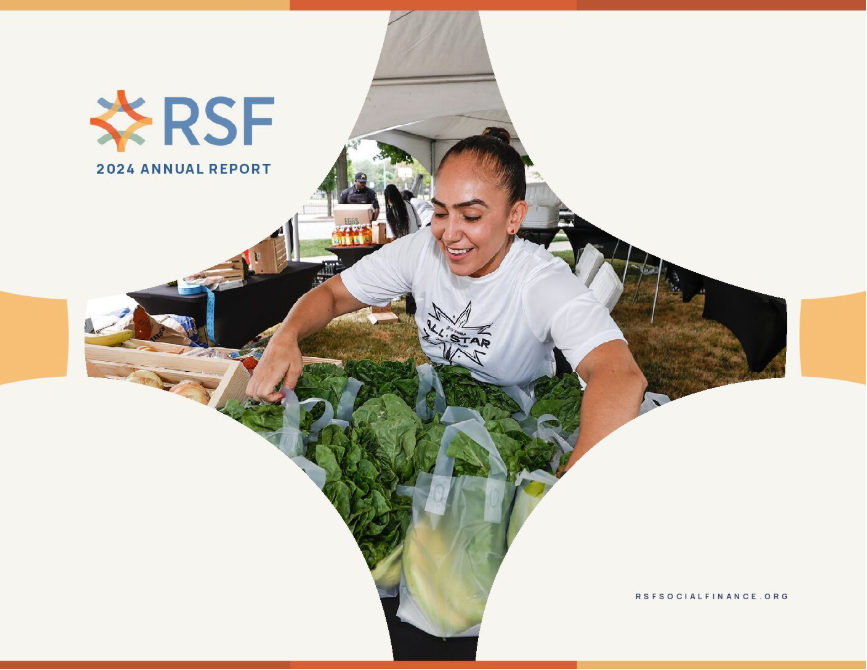Hunger and food waste are intractable problems. Or are they?
In the United States today, we throw away 40 percent of all the food that is produced, which is equivalent to tossing $218 billion into the garbage each year. These figures are staggering when you consider that 49 million Americans are food insecure, meaning they lack reliable access to sufficient quantities of affordable and nutritious food.
Recently, I have grown close to one of these food insecure Americans; he is six years old. I was introduced to this young man by my daughter, who mentors him. Despite living in a neighboring city, Berkeley in Northern California, this six-year-old’s family lacks access to healthful food due to financial inability. Often, my daughter and I picked him up hungry. My eyes were open, if not a little teary. I yearned to help, but how?
Around this time, I received an issue of the RSF Quarterly that featured an article about DC Central Kitchen. The piece showcased DCCK founder Robert Egger as he uncovered the inefficiencies of our modern food system. A nightclub manager turned social entrepreneur, Robert witnessed thousands of pounds of food being thrown away each night. This was food that, as a volunteer for a food truck serving meals to the homeless and other people in need, he could have “recycled.”
Robert’s story inspired me to reach out to him. I strongly wanted to support organizations like DCCK but hoped to find one that addressed the challenges of hunger, food waste, and employment training in my area. Through Robert, I was introduced to Dana Frasz, founder and director of Food Shift.
A lifelong passion
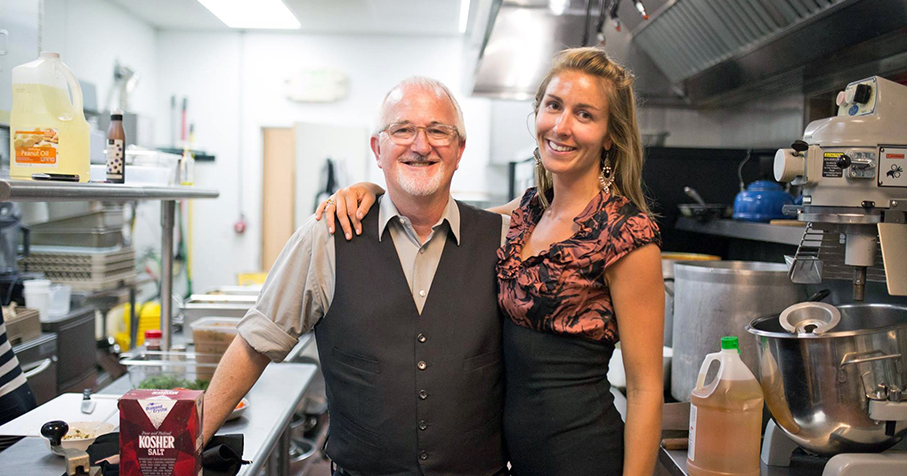
Dana’s passion for food recovery is paramount. “I feel a range of emotions when I witness or hear about food waste,” she said to me during one of our many conversations. “There’s this deep knowing in my heart that food is sacred, and yet, in our society, food is treated as a throwaway item.”
While studying at Sarah Lawrence College, Dana started an effective all-volunteer food recovery group that—to her chagrin—fell apart once she graduated. This experience taught Dana a key lesson in organizational sustainability: volunteer groups are just that, volunteers. After her studies, Dana remained committed to her cause by attending various conferences and connecting with key thinkers such as Jonathan Bloom, writer of American Wasteland, and Dana Gunders of the Natural Resources Defense Council, whose 2011 report put the issue of food waste on the map.
Something that’s impressed me about Dana in the time that I’ve known her is her unbroken focus on creating replicable models. She is dissatisfied with single-minded approaches, choosing instead to consider collaborative and systemic solutions.
In 2011, while attending a Bay Area sustainable food conference, it dawned on Dana that food waste was missing from the larger food system conversation. “Over the course of three days and dozens and dozens of speakers, there was not one person talking about food waste, and it drove me crazy,” said Frasz.
She needed to take action. As she had done at countless events before, Dana investigated where the huge smorgasbord left over from the conference would be going that evening. Sure enough, it was not to hungry stomachs. Dissatisfied, Dana found the densest food item she could—chicken—and carried 40 pounds of it that night to the streets of San Francisco.
Ecosystem of solutions
Shortly after this experience, Dana founded Food Shift, an idea incubator, think tank, and social enterprise based in Oakland, California. The organization’s initial focus was increasing awareness and education for an issue that had largely existed in the shadows. In 2014, Food Shift publicized a series of ads on Bay Area public transit highlighting connections between food waste and water usage; at that time, California had been under pressure from a severe drought that had crippled the state for three years.
Food Shift then developed a food recovery program in partnership with Stopwaste.org and the Oakland Unified School District. The “Food for Kids” program collected over 14,000 pounds of surplus food from 13 Oakland school cafeterias and redistributed it to students and their families and community organizations. A guide to replicate the model at other schools will be released in early 2017.
Santa Clara study
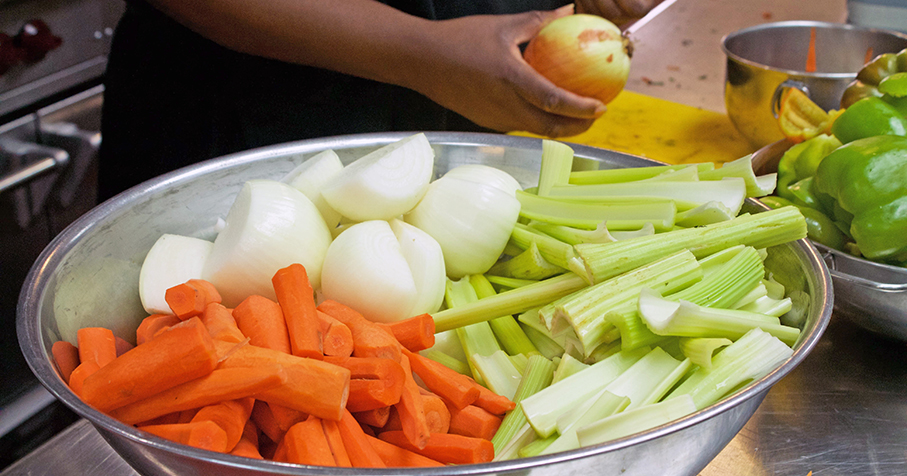
In early 2015, Santa Clara County hired Food Shift to do an assessment of where and why food is being wasted in the region. Food Shift staff members spoke with dozens of food businesses, recovery groups, and social service agencies for their research. The findings uncovered two major challenges in the sector that limited impact: capacity and infrastructure. Food assistance groups were running on shoestring budgets—unable to afford refrigeration, storage, vehicles, or staff—while undoubtedly performing a service to the community.
Of the many key findings from the Santa Clara project, three stand out: 1) there is a lot more surplus food available, 2) one in four people in Santa Clara County are food insecure, and 3) we need investment in food-recovery infrastructure.
In addition to these realities, we must recognize that the answer goes beyond just supplying food to the needy. As Frasz has commented, “food alone won’t solve hunger. If we truly care about feeding people, we need to do more than just give out food. That’s why the models we’re looking to create involved workforce development, job training, and employment in food recovery, specifically for the people who need the jobs the most.”
Showing how it’s done
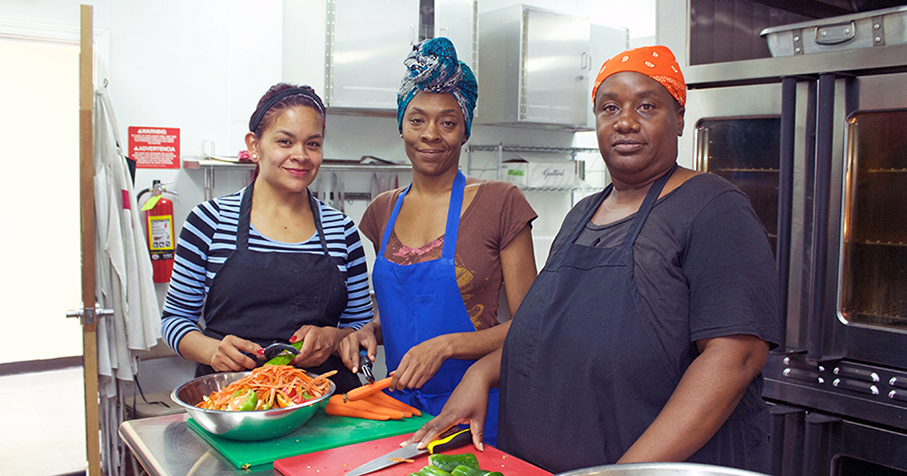
From this core belief and in response to the reality that one in five fruits and vegetables grown do not fit the strict cosmetic standards of grocery stores and are discarded, Food Shift launched Alameda Kitchen in June 2016. The kitchen uses surplus or “ugly produce” and turns it into highly nutritious soups and other products. An alternative to the traditional charity model, Alameda Kitchen aims to support ongoing operations and program growth through the sale of food products it produces. Imperfect Produce, an RSF client, fuels the kitchen with generous food donations and advisory support.
Alameda Kitchen is housed at Alameda Point Collaborative, a housing community for previously homeless individuals—the majority of them are unemployed and living in poverty. The kitchen has committed to hiring residents of the collaborative.
In its first class this summer, the Alameda Kitchen had a significant impact on the lives of program participants. In addition to gained culinary expertise, participants also experienced weight loss, monetary savings, improved diets for their children, and increased self-confidence. And this is just the beginning.
“The Alameda Kitchen is going to spark a shift towards a more sustainable food ecosystem in the Bay Area,” said Frasz. “By recovering surplus food, expanding processing infrastructure, and creating effective outreach to communities in need, we will feed more people and waste less food.”
To reach this goal, Food Shift needs support to purchase critical transportation and refrigeration equipment that expands its ability to store and deliver healthful food products safely.
So you see, hunger and food waste are not intractable problems. They’re ones ripe for solving.
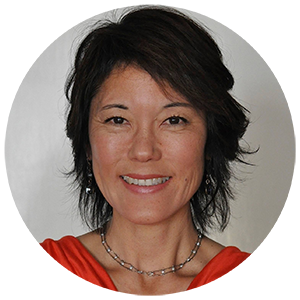
Suzanne is a donor and volunteer at Food Shift.
